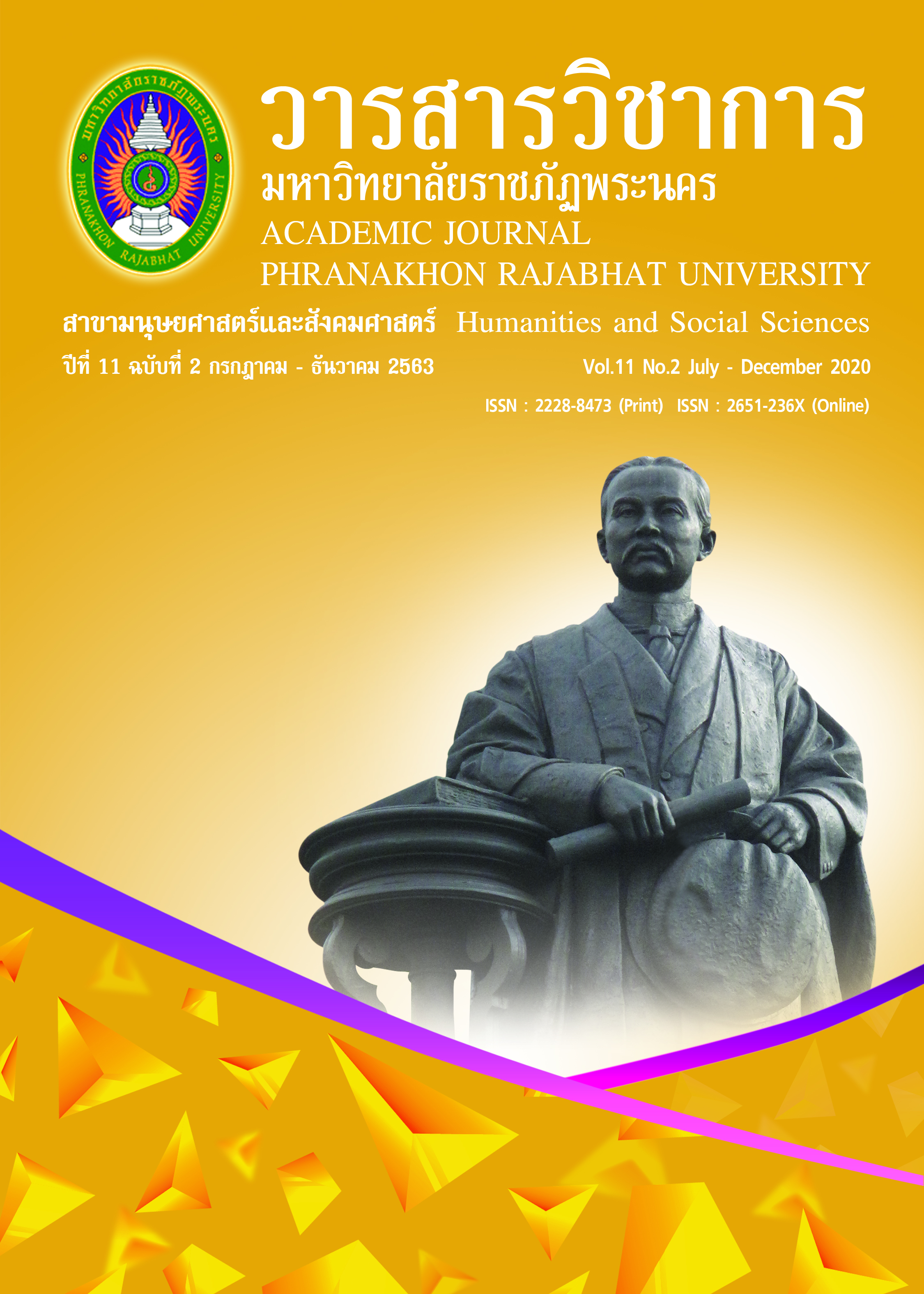The Desirable Characteristics of Graduated Students in the Viewpoints of Mass Communication Enterprises
Keywords:
Keywords : Graduate Characteristics, Entrepreneur, Mass CommunicationAbstract
The objectives of this research include 1) to study the desirable characteristics of graduates from mass communication-related organizations 2) to analyze the characteristics of graduates comparing with expectations of mass communication-related organizations, and their obstacles and limitations, and 3) to provide suggestions on developing the graduates in Mass Communication Study. This qualitative research conducted by in-depth interview and focus group approaches with four groups of key informants. A purposive selection was conducted for four academic officers, twenty undergraduate students, two private entrepreneur, and two public enterprise representatives, total of twenty-eight informants and discussants were participated. The result shown that;
- The organizations expected that the graduates would have eight characteristics include 1) assertiveness 2) being ethical 3) aware of function for society 4) technology literacy 5) diverse knowledge integration ability 6) creative problem solving 7) aware of possible impact 8) systematic thinking
- The comparative analysis between expectation and perceived characteristics of graduates by the organizations lead to the expressions that the media enterprises should involve in curriculum development of Mass Communication Study in higher education institutes, the graduates should have encouragement and capacity to integrate members of different power groups and from different societies to live with harmony, as well as should have a wider and deeper cognitive approaches with ability to differentiate between belief opinion knowledge and fact.
- Suggestions for development of Mass Communication graduates consist of 1) the curriculum have be based on the principles of mass media communication 2) internship program must consistent with the demand of labor market 3) the study program must integrate with knowledge from other subjects 4) the curriculum has to support the students for foreign language development.
Keywords : Graduate Characteristics, Entrepreneur, Mass Communication
References
จักร์กฤษ เพิ่มพูล. (2554). Nation way หลักจริยธรรมของคนข่าวเครือเนชั่น (ผิดจากนี้ไม่ใช่เรา)
กรุงเทพฯ: กรุงเทพธุรกิจ, 116 หน้า
จิรพร วิทยศักดิ์พันธ์ และคณะ. (2554). การสำรวจความคิดเห็นของบัณฑิตต่อหลักสูตรภาควิชาการ
สื่อสารมวลชน คณะมนุษยศาสตร์ มหาวิทยาลัยเชียงใหม่. รายงานฉบับสมบูรณ์.
ณิรดา เวชญาลักษณ์ (2558) การพัฒนาพฤติกรรมการกล้าแสดงออกโดยใช้วิธีการแสดงบทบาท
สมมติของนักศึกษาคณะครุศาสตร์ มหาวิทยาลัยราชภัฏพิบูลสงคราม, วารสารครุพิบูล, 2(1),
29-36.
ดุษฎี วรธรรมดุษฎี. (2558). ทุนนิยมมีชีวิต ธุรกิจมีหัวใจ.มหาวิทยาลัยเกริก, วารสารร่มพฤกษ์, 33(2),
17-25.
ธัญญาพร ก่องขันธ์ และสมทรง สิทธิ. (2561). การวิจัยและพัฒนารูปแบบการจัดกิจกรรมการเรียนรู้ที่
ส่งเสริมความสามารถในการแก้ปัญหาอย่างสร้างสรรค์ สำหรับนักศึกษาระดับ อุดมศึกษา
วารสารศึกษาศาสตร์ มหาวิทยาลัยมหาสารคาม. 12(2), 83-96. [ออนไลน์]. สืบค้นจาก
https://edu.msu.ac.th/journal/home/journal_file/452.pdf
ธารา, ทวีโภค. (2559). คุณลักษณะที่ดีของผู้ประกอบการวิสาหกิจขนาดกลางและขนาดย่อม
.[ออนไลน์]. สืบค้นจาก http://hdl.handle.net/123456789/1296
นิสดารก์ เวชยานนท์. (2556). ระบบการสรรหา พัฒนาและรักษาบุคลากรภาครัฐของไทย (พ.ศ.
2418-ปัจจุบัน). คณะรัฐประศาสนศาสตร์ สถาบันบัณฑิตพัฒนบริหารศาสตร์ : กรุงเทพฯ
เบญจวรรณ ถนอมชยธวัช และคณะ. (2559). ทักษะแห่งศตวรรษที่ 21: ความท้าทายในการพัฒนา
นักศึกษา. วารสารเครือข่ายวิทยาลัยพยาบาลและการสาธารณสุขภาคใต้. 3(2), 208-222
แผนพัฒนาเศรษฐกิจและสังคมแห่งชาติ. (2560). สำนักงานคณะกรรมการพัฒนาการเศรษฐกิจและ
สังคมแห่งชาติ [ออนไลน์]. สืบค้นจาก http://www.nesdb.go.th/ewt_news.php?nid
=6420&filename=develop_issue
แผนอุดมศึกษาระยะยาว 20 ปี พ.ศ. 2561 - 2580 .(2561). สำนักนโยบายและแผนการอุดมศึกษา
สำนักงานคณะกรรมการการอุดมศึกษา, บริษัท พริกหวานกราฟฟิค จำกัด.
พัชราภรณ์ ศรีสวัสดิ์. (2550). การศึกษาการตระหนักรทางสู่สังคม และการสรางโมเดลการใหคํา
ปรึกษากลุม เพื่อพัฒนาการตระหนักรู้ทางสังคมของวัยรุนไทย ปริญญาการศึกษาดุษฎีบัณฑิต
สาขาจิตวิทยาการให้คําปรึกษา มหาวิทยาลัยศรีนครินทรวิโรฒ. [ออนไลน์]. สืบค้นจาก
http://thesis.swu.ac.th/swudis/Coun_Psy/Patcharaporn_S.pdf
เพิ่มพร ณ นคร และ ณัฏฐ์วัฒน์ ธนพรรณสิน. (2560). การใช้ทฤษฎีบทบาทหน้าที่ของสื่อกับ
สื่อมวลชน.วารสารการสื่อสารมวลชน. คณะการสื่อสารมวลชน มหาวิทยาลัยเชียงใหม่,
5(2), 144-163 .
ราชบัณฑิตยสถาน. (2554). ตระหนัก. [ออนไลน์]. สืบค้นจาก http://www.royin.go.th/dictionary/
วสุธิดา นุริตมนต์ และทรงวิทย์ เจริญกิจธนลาภ. (2561). ปัจจัยที่มีอิทธิพลต่อ
การยอมรับเทคโนโลยี และความตั้งใจใช้บริการชำระเงินของผู้บริโภครุ่นใหม่ ด้วยโปรแกรม
ประยุกต์คิวอาร์โค้ดผ่านโทรศัพท์เคลื่อนที่สมาร์ทโฟน. วารสารวิชาการนวัตกรรมสื่อสารสังคม
6(2), 40-50
วิจารณ์ พานิช. (2555). วิถีสร้างการเรียนรู้เพื่อศิษย์ในศตวรรษที่ 21. กรุงเทพฯ: ตถาตา พับลิเคชั่น.
[ออนไลน์]. สืบค้นจาก http://www.noppawan.sskru.ac.th/data/learn_c21.pdf
สาคร สมเสริฐ. (2556). ความแปลกแยกของมนุษย์ในสังคมสมัยใหม่.วารสารนักบริหาร.
มหาวิทยาลัยกรุงเทพ, 33(3), 25-33.
สำนักงานกิจการกระจายเสียงกิจการโทรทัศน์ และกิจการโทรคมนาคมแห่งชาติ. (2557). คู่มือ
จริยธรรมและการกำกับดูแลกันเองในกิจการกระจายเสียงและกิจการโทรทัศน์. [ออนไลน์].
สืบค้นจาก https://broadcast.nbtc.go.th/data/academic/file/570500000006.pdf.
ไสว ฟักขาว. (2562) ทักษะแห่งศตวรรษที่ 21 [ออนไลน์]. สืบค้นจาก
http://web.chandra.ac.th/blog/wp-content/uploads/2015/
อริน เจียจันทร์พงษ. (2561). บทบาทของสื่อไทยในการเปลี่ยนแปลงทางการเมือง, 11(3), 2632-
2647. [ออนไลน์]. สืบค้นจาก https://www.tci-thaijo.org/index.php/Veridian-E-
Journal/article/download/161302/116311/
Alberti, R.E. & Emmons. M.L., (1989). Your perfect right: A Guide to assertive living.10th
ed. California: Impact.
Baran, Stanley J., and Dennis K. Davis. (1995). Mass communication theory:
foundations, ferment, and future. Belmont, Calif: Wadsworth Pub. Co.
Good, Carter V. (1973). Dictionary of Education. New York: McGraw-Hill Book.
Langone, John; & Black, Rhonda S (1997). “Social Awareness and Transition to
Employment for Adolescents with Mental Retardation,” Remedial and
Special Education. 18 : 214-222. Retrieved September, 01, 2005. From
http:// unweb.hwwilsonweb.com
Senge, Peter. (1993). The Fifth Discipline: The Art & Practice of the Learning
Organization. London: Century Business.
Sternberg, R.J. & Grigorenko, E.L. (2007). Teaching for Successful Intelligence. 2 nd.
Thousand Oaks, CA: Corwin Press.

Downloads
Published
How to Cite
Issue
Section
License
"บทความวิชาการในวารสารฉบับนี้ ถือเป็นความรับผิดชอบของผู้เขียนเท่านั้น"
สงวนลิขสิทธิ์ตามพระราชบัญญัติลิขสิทธิ์



